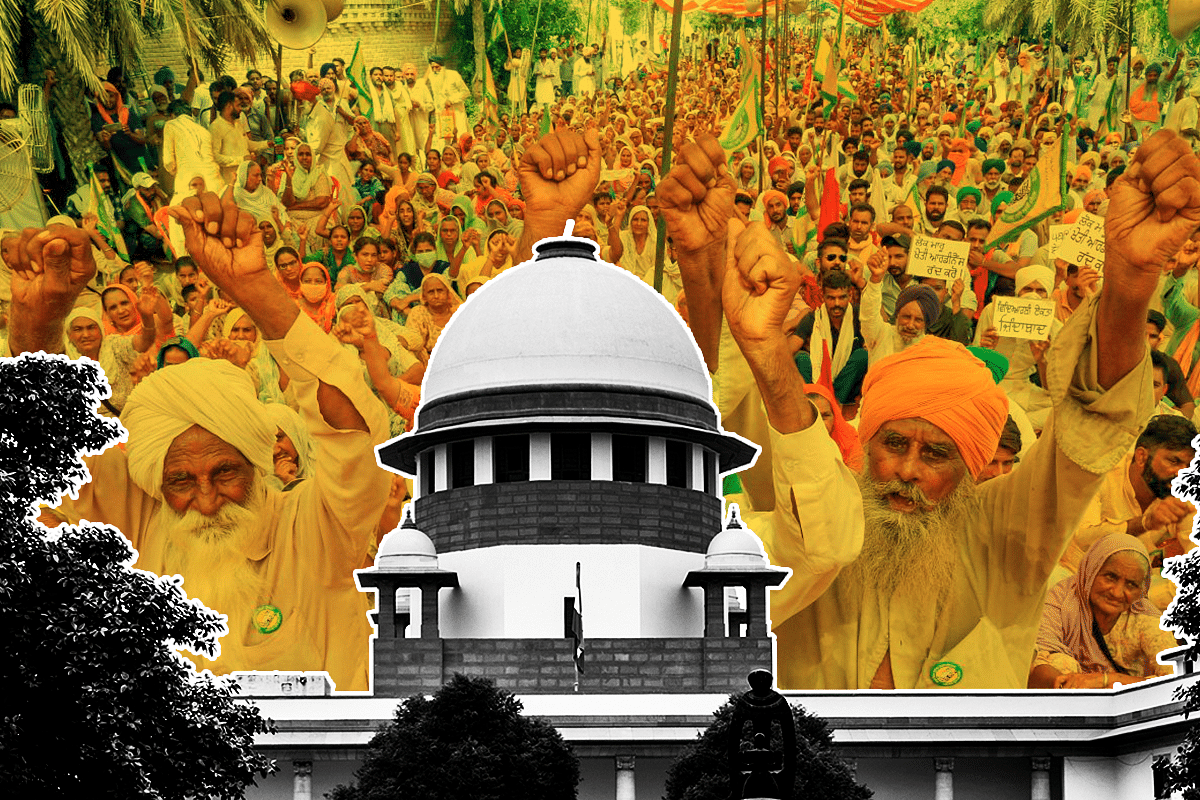Politics
The Real Takeout From SC’s Meddling In Farm Dispute: Public Blackmail Works
- This is why the Supreme Court should get a big zero for this unwarranted intervention.

The Supreme Court’s job is the ‘interpretation’ of the law, and not its ‘making’.
It is not difficult to see who wins and who loses from the Supreme Court’s decision today (12 January) to stay the implementation of three farm reform laws and constituting a four-member committee to resolve the dispute. The committee includes two farm experts and two farm union representatives.
The scorecard at the end of nearly 50 days of protests in the “Farmers Vs Government” dispute will read thus: Parliament lost. Judiciary lost. Government lost. Farmers lost. India lost.
There is, though, one winner. Blackmail and thuggery won. The next time anyone wants to get his way, he will gather large crowds in Delhi, read from the preamble to prove peaceful intent and a foolish media will read saintly intent rather than notice the actual damage to public property (over 1,500 mobile towers in Punjab) and inconvenience to ordinary citizens, and the courts will intervene by blaming the government for intransigence and incompetence. Sad.
The Supreme Court, which has no business intervening in a matter that is squarely in the jurisdiction of the legislature, has once again run a coach-and-four over the basic principle that its job is the ‘interpretation’ of the law, and not its ‘making’.
By repeatedly exceeding its constitutional brief, it has damaged its own credibility and ability to play neutral arbiter in settling disputes and correct wrongdoing. In this case, it has effectively said that it will overlook illegal occupation of public spaces and damage to public property to ensure an end to protests.
Worse, the court has suffered reputational damage, because the farm unions have refused to recognise the Supreme Court’s locus standi in the matter, and most of them will probably refuse to participate in the proceedings of the committee.
The worst aspect of this issue is that the Supreme Court has quietly accepted this snub and said that it will neither ask the farmers to stop their agitation, nor expect them to accept the decision of the committee.
The government has lost out, for it has been forced once more to cede legislative ground to unelected judges. But one can understand its reluctance to precipitate a constitutional crisis by contesting the court’s intervention as unwarranted. It could have done so by pointing out that till the laws themselves are declared unconstitutional, the court should not be injecting itself into the dispute.
And what of the farmers? Have they really won? This is the real tragedy. What has really happened is that India’s millions of small and marginal farmers have mortgaged their futures to a bunch of ego-driven union leaders who don’t know how to compromise and win concessions from the government. Their all-or-nothing approach may serve rich farmers, but ultimately the smaller farms will be left high and dry.
Consider just who is behind the farmer protests. Of the 40 unions said to be agitating for the rescinding of the farm reform laws, 32 are from Punjab. If the other eight are backing them, it is out of a sense of solidarity, not because their interests are aligned.
At some point, this solidarity will crack and poorer farmers realise that rich farmers have been firing their guns using their shoulders, and the laws that should benefit them will not be repealed and they will be left high and dry.
Small farmers would have benefited by asking government to provide them with the follow-up action to create more producers’ cooperatives, add values to basic commodities, and give them bargaining powers with retailers and companies in the agro-foods business. They could also have asked for regulators to protest their interests. But instead their leaders have asked for status quo, and we know what the status quo means for small and marginal farmers.
Instead, the short-sighted farm leadership has made sure that no government will ever do any reform that actually addresses the real issues faced by the 86 per cent of farmers who are small and marginal (ie, holding less than two hectares).
The real remedy is to improve productivity, consolidate land-holdings, and provide jobs to agricultural households which cannot support so many dependents. If governments in future keep expanding public procurement and offering more loan waivers and subsidy regimes, they are setting themselves up for fiscal stress and finally bankruptcy. No one is going to be sympathetic to farmers if they are going to bring India to its knees this way.
The silent majority, most of whom are urban citizens and consumers of agri-produce, including rural citizens themselves, will no longer have any kind of empathy for poor farmers. Their self-serving leaders have dented and damaged an economic recovery after the hard blows landed by Covid.
The Supreme Court bench, headed by Chief Justice S A Bobde, did not realise that it was making a fool of itself by asking why no petition supporting the farm laws was seen when it should be obvious to anyone that demands for intervention usually come from those who are aggrieved, not those happy with the existing state of affairs.
The court should get a big zero for this unwarranted intervention.
Introducing ElectionsHQ + 50 Ground Reports Project
The 2024 elections might seem easy to guess, but there are some important questions that shouldn't be missed.
Do freebies still sway voters? Do people prioritise infrastructure when voting? How will Punjab vote?
The answers to these questions provide great insights into where we, as a country, are headed in the years to come.
Swarajya is starting a project with an aim to do 50 solid ground stories and a smart commentary service on WhatsApp, a one-of-a-kind. We'd love your support during this election season.
Click below to contribute.
Latest